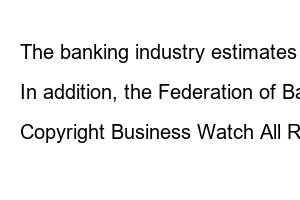자영업자 이자환급Based on the financial resources provided by the bank, it is expected that 1.87 million self-employed people and small business borrowers will be able to receive support. Those eligible for support will receive a portion of the loan interest paid in cash back.
Financial authorities and the banking sector held a meeting at the Federation of Banks in Jung-gu, Seoul on the 21st and announced the ‘banking sector’s livelihood finance support plan’ for self-employed people and small business owners. In attendance were Financial Services Commission Chairman Kim Joo-hyun, Financial Supervisory Service Chairman Lee Bok-hyun, Korea Federation of Banks Chairman Cho Yong-byeong, and presidents of 20 banks.
2 trillion won in banking secured… Contribution based on net profit
The bank’s plan to support people’s livelihoods focuses on directly lowering a certain level of the interest rate burden that has increased since the end of COVID-19 finance to the maximum extent possible without harming the soundness of the bank so that borrowers can feel it.
First, 18 banks, excluding KDB Korea Development Bank and the Export-Import Bank of Korea, will provide at least 2 trillion won in support. The sharing level was set at a maximum of 10% of each bank’s net profit. Considering this, the five major commercial banks are expected to share around 200 billion to 300 billion won. Korea Development Bank and Export-Import Bank plan to provide additional support through policy finance programs.
In relation to this, the Korea Federation of Banks explained, “As banks’ net profits have increased significantly, demands for social responsibility have increased,” and “As the soundness of banks is the most important, we judged it reasonable to use net profits as the basis for distribution.”
The funds raised will be used to cover support costs for vulnerable groups such as self-employed people and small business owners, as well as organizations supporting vulnerable groups. This is the largest ever scale of win-win financial activities in the banking sector.
90% refund for amounts paid in excess of 4% annual interest… Up to 3 million won
Looking at the specific support details, interest refund (cashback) is provided to borrowers who hold personal business loans as of the previous day (20th) as a common program in the banking sector. The interest refund amount is 90% of the interest paid in excess of 4% for one year with a limit of 200 million won for the loan, and the total refund limit is set at 3 million won per borrower.
For example, the interest eligible for cashback for first-time borrowers before December 21st of last year is from the time of loan until December 20th of this year, and the interest for first-time borrowers on April 1st of this year is from the time of loan until March 31st of next year.
In terms of amount, if the loan amount is 300 million won and the interest rate is 5%, the standard for calculating interest refund is 1.8 million won, which is 90% of the 4% excess interest rate (5%-4%) for 200 million won. However, each bank can voluntarily adjust some support criteria in consideration of soundness and burden capacity, and real estate rental loan borrowers are excluded from support.
The banking industry estimates that through this common program, it will be possible to provide funding of 1.6 trillion won, or about 80% of total financial resources, to 1.87 million individual business owners. The plan is to use the remaining 400 billion won of financial resources to support small business owners in ways other than interest refunds such as electricity bills and rent, and to support vulnerable groups other than the self-employed and small business owners.
The banking sector will establish a common program implementation plan by mid-January next year and begin providing interest refund support in February. The plan is to execute as much as possible by March to increase the sense of support. The Korea Federation of Banks expects that 50% will be implemented by March. The autonomous program will also complete the establishment of execution plans for each bank during the first quarter and be implemented quickly within the year.
In addition, the Federation of Banks decided to collect, inspect and announce the execution performance of each bank under this plan on a quarterly basis and actively support its implementation to ensure that it is implemented effectively.
Business Watch Co., Ltd.
Copyright Business Watch All Rights Reserved.

